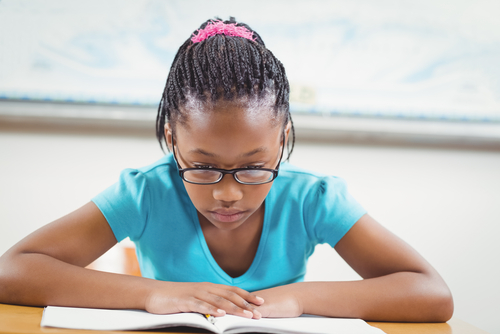Some good news in the world of children’s literature on this Martin Luther King Jr. Day. You may have heard of a completely misguided children’s book that was released by Scholastic earlier this month called A Birthday Cake For George Washington, by Ramin Ganeshram with illustrations by Vanessa Brantley-Newton. Told from the point of view of a slave girl – Delia, the daughter of George Washington’s cook, Hercules – it tells the story of baking a cake for Washington’s birthday. A cutesy, heartwarming story if not for the, you know, slavery. Thankfully, Scholastic has wised up and pulled the book.
At first, Ganeshram tried to explain over at the Scholastic blog that the book was based on research, and that it was supposed to be a testament to the resourcefulness of slaves, saying:
How could they smile? How could they be anything but unrelentingly miserable? How could they be proud to bake a cake for George Washington? The answers to those questions are complex because human nature is complex. Bizarrely and yes, disturbingly, there were some enslaved people who had a better quality of life than others and ‘close’ relationships with those who enslaved them. But they were smart enough to use those ‘advantages’ to improve their lives.
And yes, the book’s author and illustrator attempted to put the book in historical context with a note in the front, but that doesn’t change the fact that, within the narrative of the actual story, all you see is a slave father and daughter happily baking a cake for their owner, taking pride in their work as if it were work that were getting paid with a wage. As if Hercules’ lifelong dream was to be a baker, and he had just opened up his own business. Not only is this racially insensitive, but historically irresponsible, especially if this is a book geared toward 2-5 year olds.
Scholastic explained their reasoning behind pulling the book (as if they needed to) in a statement yesterday:
While we have great respect for the integrity and scholarship of the author, illustrator and editor, we believe that, without more historical background on the evils of slavery than this book for younger children can provide, the book may give a false impression of the reality of the lives of slaves and should therefore be withdrawn.
Literature, particularly children’s literature, needs to be more diverse. If children don’t see themselves, and don’t see a variety of types of people from an early age, they will have a harder time later in life putting other cultures, body types, histories, and belief systems into context. I’m glad that Scholastic recognized that a book like this could do more harm than good, and elected to prevent that harm from being done.
Here’s hoping they work that much harder to allow a diverse group of writers and illustrators to tell educational and inspiring stories including characters of all races or ethnicities, body types, and abilities that are more true to actual experience. Every child deserves not only to see themselves in the books they read, but to be exposed to the beautiful variety of the wider world. Books are often a child’s first glimpse of lives other than theirs. Let them be good ones. Or if not good, at least accurate.
(via Jezebel, image via Shutterstock)
—Please make note of The Mary Sue’s general comment policy.—
Do you follow The Mary Sue on Twitter, Facebook, Tumblr, Pinterest, & Google +?









Published: Jan 18, 2016 07:12 pm